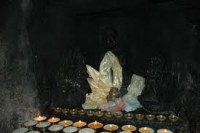Nepal Trust for Nature Conservation
Established in 1982 as an autonomous and not-for-profit organization by a Legislative Act, the National Trust for Nature Conservation (NTNC) was founded to work in the field of nature conservation in Nepal. The trust has been successful to carry out over two hundred small and large projects on nature conservation, biodiversity as well as cultural heritage protection, ecotourism and sustainable development since its inception.
The experience of the Trust has demonstrated that conservation efforts in low income economies, such as Nepal, are only possible (in terms of success and sustainability) if the needs and welfare of the local people are addressed. The activities of the NTNC have been focused on the holistic and integrated conservation and development program with active people’s participation aimed at promoting local guardianship. The activities of the trust have spread from the sub-tropical plains of Chitwan, Bardia and Kanchanpur in the lowlands to the Annapurna and Manaslu regions of the high Himalayas including the trans-Himalayan region of Upper Mustang and Manang in terms of geography.
To preserve the natural heritage and to achieve a high quality human life is the major goal of the National Trust for Nature Conservation and to meet its goal, it works closely with many international organizations.
The trust is recognized nationally and internationally for pioneering, conceptualizing and implementing innovative ideas like implemented landscape level conservation programs, successfully managing two Conservation Areas in Nepal, community based conservation interventions, implementation of a self-financing national conservation modality, contributing in developing and implementing eco-tourism model, managing the only national zoo in the country in a financially sustainable manner, linking micro-hydro promotion with forest protection in program areas, etc.
It has also received awards like J. Paul Getty Conservation Award, UNEP Global 500 Award, Deutscher-Riesbuto-Varband Award of Tourism and Environment and Abraham Conservation Award from WWF for the Tourism Management Sub-committee of Chhomrong village for its contributions in the field of environment conservation and promotion of eco-tourism.
The activities of the trust operated completely by the Nepalese citizens are based in and around Chitwan National Park, Bardia National Park and Shuklaphanta Wildlife Reserve located in the central, western and far-western development regions of Nepal (in the lowlands) through the Biodiversity Conservation Center (BCC) in Chitwan, Bardia Conservation Program (BCP) in Bardia and the Shuklaphanta Conservation Program (SCP) in Kanchanpur. In mountain region, the trust manages three projects that are Annapurna Conservation Area Project (ACAP), Manaslu Conservation Area Project (MCAP) and Gaurishankar Conservation Area Project (GCAP). In the Kathmandu valley, the trust manages only one project, the Central Zoo. It has established an Energy and Climate Change Unit to address the emerging issues of climate change through mitigation and adaptation approach and renewable energy technologies as a new initiative and has also started to work on urban environment conservation with the Bagmati River Conservation Project.







